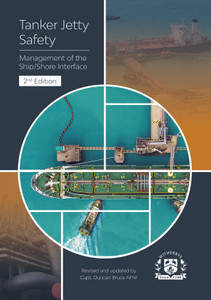
The Shipmaster’s Bunkering Manual is a unique result of cooperation between BIMCO and IBIA to create insight and practical understanding of bunkering across the shipping sectors.
The purpose of this manual is to create a common understanding of best practices when bunkering so as to facilitate smoother bunker deliveries and safe handling around the world.
This publication aims to provide the industry with an important tool for everyone involved directly in bunkering to be fully aware of how to execute bunkering in practice.
The manual covers the fuel types, regulations and contracts directly associated with marine fuels as well as detailing the origin and supply chain of marine bunkers. It also details bunkering procedures and explains the process of measuring and calculating the contents of supply vessel and ship’s tanks before and after a bunker delivery.
BIMCO members, please enter the Promotional Code ‘BIMCO’ during checkout for 20% off.
Note: BIMCO members have access to the data included in this publication on the BIMCO website.
Foreword
Foreword
for
The
IBIA
&
BIMCO
Shipmaster’s
Bunkering
Manual
Bunkering
is
a
crucial
element
of
running
a
ship.
The
process
can
heavily
impact
cost,
and
potentially
the
environment,
safety
of
the
cargo,
the
ship,
and
its
crew.
Therefore,
it
is
critical
for
everyone
involved
directly
in
bunkering
to
be
fully
aware
of
how
to
execute
bunkering
in
practice.
The
Shipmaster’s
Bunkering
Manual
is
a
unique
result
of
cooperation
between
BIMCO
and
IBIA
to
create
insight
and
practical
understanding
of
bunkering
across
the
shipping
sectors.
Bunker
suppliers
and
buyers
do
not
always
see
the
world
in
the
same
way,
which
can
create
tension
and
commercial
issues.
With
the
launch
of
this
publication,
BIMCO
and
IBIA
aim
to
create
a
common
understanding
of
best
practices
before,
during
and
after
bunkering
to
facilitate
bunker
deliveries
and
safe
handling
world-wide
every
day.
This
is
the
fundamental
purpose
of
the
manual.
As the shipping industry works towards decarbonisation, bunkering is expected to become even more complicated than it is today, as the demand for alternative fuels rises. IBIA and BIMCO, therefore, plan to review and update the manual on a regular basis in the transformative years to come, with the aim of providing the industry with an important tool in the process.
Unni
Einemo
IBIA
David
Loosley
BIMCO
Foreword
Definitions and Acronyms
Chapter 1 Fuel types, regulations and contracts
1.1 Risk and importance
1.2 Marine fuel oil
1.3 Key regulations
1.4 Contracts and charter parties
Chapter 2 Origin and supply chain of marine bunkers
2.1 Bunker nomination and quantity
2.2 What to bunker
2.3 What to do if sulphur compliant fuel is not available
2.4 Port-specific rules
2.5 The role of the agent
2.6 Preparing the bunker lines, tanks, fuel distribution and management systems
2.7 Sampling preparation and equipment
2.8 Bunker Delivery Note (BDN)
2.9 Certificates of quality
2.10 Bunker nomination
2.11 Checklists
2.12 Bunker checklist aide-memoire
Chapter 3 Bunkering procedure
3.1 The roles of the members of the ship bunkering team
3.2 MARPOL delivered sample and samples for commercial use
3.3 Monitoring of the bunkering process
3.4 Spills
3.5 Health and safety during a bunkering operation
3.6 Checklists
Chapter 4 Calculation of bunker quantity
4.1 Calculation of bunker quantity
4.2 Sample storage
4.3 Bunker fuel comingling and compatibility testing
4.4 Interpretation of fuel quality test data – commercial and statutory considerations
4.5 Oil Record Book (ORB)
4.6 When things go wrong
4.7 Storage of bunker fuels
4.8 Checklist after completion of the bunkering operation
Annexes
BIMCO
BIMCO is the world’s largest direct-membership organisation for shipowners, charterers, shipbrokers and agents. In total, around 60% of the world’s merchant fleet is a BIMCO member, measured by tonnage (weight of the unloaded ships).
The organisation has NGO status and is based in Copenhagen, Denmark, with offices in Athens, Singapore and Shanghai.
With around 1900 member companies across 120 countries, from the largest shipowners in the world to small local port agents and law firms, BIMCO represents a wide range of maritime companies and organisations.
BIMCO’s goal is to secure a level playing field for the global shipping industry. BIMCO therefore works to promote and secure global standards and regulations for the maritime sector. The organisation’s century long effort into creating standard contracts and clauses is an expression of that aim.
- Number of Pages:
- 131
- Published Date:
- October 2022
- Book Height:
- 297 mm
- Book Width:
- 210 mm
- Weight:
- 1.4 kg
- Author:
BIMCO
- ISBN:
- 9781914992698
- Preview:
- Yes
- Publication Date:
- October 2022






